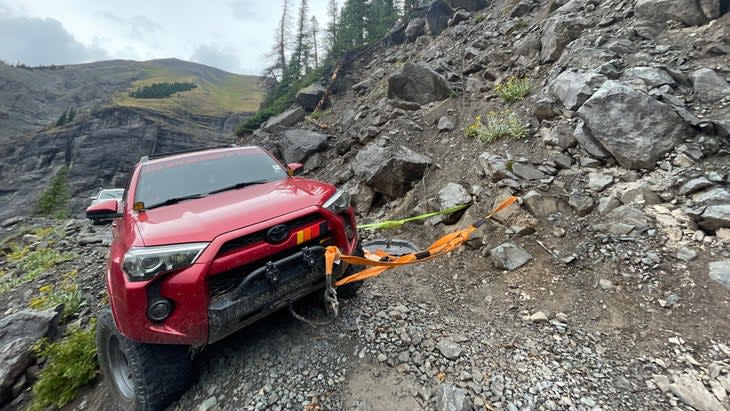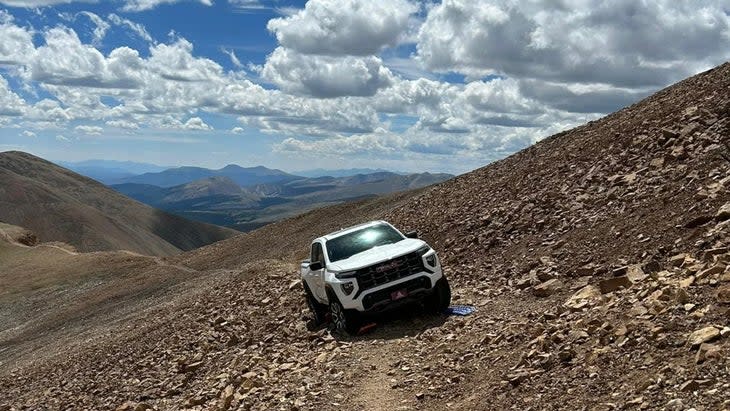Off-Road Rescues in Colorado Are Getting Out of Hand
This article originally appeared on Outside
For years, Bill Masters privately used a term for motorists who got stuck in bewildering fashion on mountain passes in Colorado's San Miguel County. Masters, who is the county sheriff, called them "ass clowns."
This summer, Masters felt justified taking the term public. In mid-August, a group of drivers ventured up the closed Black Bear Pass, an expert-level jeep trail between Telluride and Silverton. The top of the pass was covered in snow, so they dug through the drifts to clear the road.
When news of their exploits spread on off-road social media platforms, more ventured up the sketchy trail. Eventually, someone's Toyota 4Runner skittered off the roadway and became utterly stuck.
"Some people have it together and know what they are doing, but some who venture up there are complete ass clowns," the San Miguel Sheriff’s Office posted on Facebook on August 14. Susan Lily, spokeswoman for the office, said the rescue mission was costly and never should have happened. She said the sheer frustration over the situation led to the derogatory language being used in an official capacity.
"I have, quite frankly, not been comfortable with putting it in a quote on behalf of the Sheriff’s Office," she said. "But in this particular instance, it seemed appropriate to use it. Plain and simple, it wasn’t safe to be up there, which is why the pass was closed."

So far, 2023 has been a banner year for, um, ass clowns on Colorado's high passes--photos of stuck vehicles have spread across social media, and incidents of stranded cars have been covered by local news outlets. A representative from the Colorado Department of Transportation said that the agency does not keep statistics on these rescues, since many occur on land managed by the Forest Service or the Bureau of Land Management.
"There are definitely more people out on the landscape recreating," said Chad Schneckenburger, regional trails program manager for the NFS. "And for better or for worse, people don't always inform themselves before they go out and recreate."
Other sources told me that there has been an increase of stranded drivers on off-road passes. Charlie Stubblefield, owner of a towing company called Mountain Recovery, which does vehicle recovery across four mountain counties in Northern Colorado, told me that business is booming. "The increase has gone up exponentially," Stubblefield said. He said that his company retrieves vehicles from off-road passes nearly every day, and business spikes during the summer. "It's crazy--we've all recognized an uptick," he said. "We're just seeing more and more stupid people with stuck vehicles in places they shouldn't be, and it's wasting our resources for real emergency rescues."
A few notable examples come to mind. There was the guy who drove a brand new GMC truck up the hiking trail to 14,295-foot Mount Lincoln in August. That same day, a red truck went off the trail on Mosquito Pass between Fairplay and Leadville and rolled down a steep slope. Also in August, a woman who had apparently eaten psychedelic mushrooms drove her Ford Mustang up a high-clearance jeep road outside of Vail.

GPS, Hubris, and Bad Decisions
There are plenty of explanations for why off-road drivers are getting into trouble more frequently, and sources I spoke to blamed it on everything from GPS systems gone awry to good old-fashioned bravado--the instinct to just go for it. Others overestimate their ability to navigate a vehicle in the mountains. Representatives from towing companies say they have seen it all.
Wayne Barger, owner of Animas Towing & Recovery in Southwest Colorado, this summer rescued a Penske truck moving furniture over Ophir Pass--a high alpine route between the towns of Silverton and Ophir.
"I asked the guy, 'At what point in your mind would you think this is an OK road to drive your box truck?'" he said. The driver, apparently, responded that his trusty Garmin told him to take that route. He wasn't the first truck driver to get stuck this way. In 2020, a 30-foot box truck also got stuck on the same pass while following a GPS route. In 2021, a Greyhound bus got stuck on a mountain road above the Glenwood Canyon stretch of Interstate 70, which was closed due to fire, flooding, and mudslide. A Greyhound spokesperson blamed a "rerouting" problem.
But GPS isn't always to blame. I contacted Brian Burke, a professor of psychology at Fort Lewis College in Durango, Colorado, about this trend, and he cited a bias called the "Dunning-Kruger effect." The psychological phenomenon is when people who are non-experts in a skillset are significantly worse at estimating their true ability in that very activity. For instance: people who are not especially skilled at driving on challenging roadways are often unable to accurately judge just how bad they are at it.
Burke also said the uptick in stuck vehicles may be tied to a different psychological dynamic found in all pursuits: people's need for attention on social media.
"Narcissism, like the Dunning-Kruger effect, can lead to unwarranted overconfidence in one's driving abilities as people attempt to pack their personal websites with beautiful and adventurous nature photos," he said.
Stubblefield chalks it up to an even more basic human foible: a lack of preparedness and knowledge. "People are completely misinformed or uninformed, and they're just going for it, letting it rip," he said.
Ophir Pass is CLOSED due to a delivery truck that is stuck and completely blocking traffic. Tow services in route. Unknown length of closure, avoid the area. pic.twitter.com/o5uCDjuRHe
— San Miguel Sheriff (@SheriffAlert) June 18, 2021
Who comes to the rescue depends on the location of the clown car in question. Throughout Colorado mountain towns, there are local towing companies that have become experts in mountain recovery. These rescues can be time-consuming, dangerous and expensive. That GMC driver who became marooned on Mount Lincoln had to pay Mountain Recovery $3,500 to tow his truck from the hiking trail. The company had to dispatch a Bobcat tractor up the trail to free the truck.
Not everybody charges for a rescue. Since 2014, Colorado 4×4 Rescue and Recovery, a nonprofit, has removed vehicles for free. In the past three years, the group has responded to 300 calls annually across the state, said Jeff Tyson, director of dispatch.
"We don’t charge because we want people to feel comfortable calling us, rather than not being able to afford a $5,000 bill and just abandoning the vehicle," he said. "That puts the cost and strain on these agencies to recover vehicles and takes resources away from actual emergencies."
An Expensive Mistake
The Forest Service recognizes the free-for-all nature of rescues is not sustainable and is working to set up a license system for operators who are qualified to conduct rescues in central Colorado. While $150 is the maximum citation the Forest Service can issue for illegal off-road travel, going through a licensed towing company will bring a sizable charge that can run as high as $5,000. That cost, Stubblefield said, could be a huge deterrent.
"The Forest Service realizes their fines are not big enough; they are meaningless," Stubblefield said. "So they want to create a system in which they can direct vehicle owners to professional companies like ours. We have a lot of teeth when it comes to our recovery, recouping costs and holding parties accountable. And we get jobs done with minimal impact to the environment."
Schneckenburger says Colorado is not the only state experiencing an uptick in off-road recovery. He cites a combination of increased traffic post-pandemic, social media exposure, and the reality that there are just some bad eggs in all user groups. The Forest Service works with all recreation groups to discuss best practices for hiking, biking and driving, Schneckenburger said, but oftentimes it's the people not involved in these groups causing trouble.
"How do we reach those people?" he said. "There's no silver bullet, of course."
Of course, there is an element of personal responsibility going into the backcountry, no matter if you are hiking or driving. Know where you're going; know the regulations; and be prepared. There are also backcountry driving training courses, and plenty of maps and proper GPS resources.
If all else fails, perhaps there's nothing wrong with a little public shaming (though, let's acknowledge we could all find ourselves in this situation one day; so it's important to show some grace, too). In fact, Mountain Recovery just signed a contract with the Weather Channel for a forthcoming television series that will follow his teams on these sometimes-ridiculous missions. The show is set to air in 2025--so viewers will have to wait until then to see more errant drivers stuck on passes and trails.
"You can't take your Honda Civic up a jeep trail," Stubblefield said. "It doesn’t work that way."
For exclusive access to all of our fitness, gear, adventure, and travel stories, plus discounts on trips, events, and gear, sign up for Outside+ today.

